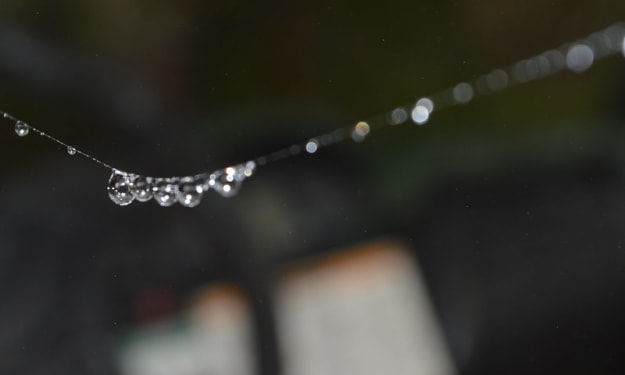UNTREATED PRESSURE
Death has sneaky ways of entering our lives.

The first dead body I saw was when I was fifteen. I was in a freezing cold funeral parlor wearing a black blouse and flowery pink skinny jeans, staring down at the lifeless body of the kid I met in remedial English. I wouldn’t say we were friends, more like acquaintances. He was liked by a lot of people but got in trouble regularly. If a teacher told him to do one thing, he’d do the opposite. His dialogue was summed up with “life sucks” and “fuck this shit." You know, one of those guys. He shrugged off authority and was a pessimist at best. He pushed against the future with a vengeance.
We weren’t friends, but I cried as if we were.
xxx
When a diver surfaces from the deep ocean too fast, they experience something called, “the bends.” It’s where nitrogen exits the body rapidly in the form of gas bubbles. This increased release of pressure is immensely harmful to the body, causing joint pain, rashes, fatigue, itching, chest pain, vomiting, and possibly death. As the diver begins to resurface, they must do it slowly in order to avoid the bends. Making a safety stop of 3 to 5 minutes between 15 to 20 feet at the end of a dive should do the trick.
These safety stops could save a person’s life.
xxx
I had never been to a funeral without my parents. I had only been to funerals for grandparents. When my group of friends and I entered the ceremony, we were asked to sign in. There were so many people at this funeral. So many I couldn’t even count them all. It felt strange and uncomfortable and otherworldly, walking around that place, like the whole population of our small rural town was here to say their goodbyes. What was this? Some sort of communal burial service? Had all of these people been invited?
Had I been invited?
xxx
In 2012, Facebook was becoming a big thing. All the teens were tossing Myspace into their past and maturing into young adults who raised virtual farms and poked their friends from several miles away. Social media was quickly becoming an outlet to express your feelings and to make sure everyone else knew you had some. When someone dies, we don’t go to their grave anymore. We go to their Facebook page, write a post about how their absence makes us feel sad, and then keep on living. To this day, that boy's Facebook page gains more and more repeated posts of “I miss you” and “can’t forget.”
I wonder who their attended audience is.
xxx
The boy’s parents decided to have an open casket. It was only once I looked inside that I started to think things through. I wondered how they made him look so alive. I wondered how his insides could just stop working, while mine and everyone else’s in that room hadn’t. I wondered how the family choose the casket. I wondered why they didn’t cover the bruises on his neck better. I wondered again how they made him look so alive, and how dare they trick us like that.
xxx
Sometimes, confusion can be painful.
xxx
I believe people grieve the same way a diver gets the bends. We try to rush out of the deep dark water to escape it. We know we should slow down, that rushing the process will only make the aftermath worse and more painful, but there are creatures below us, creatures we don’t want to face. So we rush to the surface and once we’re there we think everything will be okay. We breathe deep and feel relief. Get me out of this water and everything will be fine…but here comes the pain, those creatures have caught up to us, the ones we swore we wouldn’t look at. We can’t breathe and it hurts. We can’t move and it hurts. We can’t forget and it hurts. We can’t understand and it hurts.
xxx
My parents were furious that I hadn’t tried to reach them while I was at the funeral. They called and texted dozens of times, and I didn’t reply. I didn’t want to be rude. As they were trying to get ahold of me, the young boy's sister was at the podium telling us about the Coke can her brother left on the bookshelf in the living room before entering his room and exiting his life. She said she wasn’t sure when they’d throw it away.
xxx
Death has sneaky ways of entering our lives. It doesn’t have to barge in like a runaway train or a semi-truck losing friction on ice. Sometimes—often times—it walks in like it's paying rent. It makes itself at home and asks what’s for dinner. You can try to kick it out, pretend it’s not there, even ask nicely for it to leave, but don’t get your hopes up. It sinks in, becomes a part of you, and remains.
xxx
After the funeral, my parents had questions. Why are you crying so hard? Was he your boyfriend? Were you two close? I don’t know. No. And no. They couldn’t wrap their heads around my reaction to this boy’s death. This boy with who I had one remedial reading class over a year prior. They didn’t understand that I couldn’t wrap my head around it either. I couldn’t give them the answers they were searching for, because I hadn’t found them myself.
But I kept wondering, “Isn’t it okay to just cry when things end?”
xxx
Treatment for the bends, like many things, can be a lengthy process. If oxygen wasn’t administrated straight after the resurface, the diver will need to enter a recompression chamber. This is where the diver will experience 100% of oxygen being administrated back into their body, which in return eliminates the excess nitrogen. This process can take up to 12 hours, sometimes more. Any delay in the recovery process can result in irreversible damages.
It can take a while to fully recover.
xxx
How well should you know yourself before you can claim—believably—that you’re a good person? When you’re a teenager, do you have enough worldly experience and an open enough mind to tell the difference between a good person and a bad one? How many white lies, rolled eyes, slammed doors and cold shoulders are needed to cross the border of a normal fifteen-year-old to a selfish human being? What about walking into a funeral you weren’t personally invited to? Where does that one land? Does the excuse of being a “naive teenager” really get us anywhere? Why does it have to take years for us to realize how wrong we’ve been?
xxx
It is important for every diver to understand how to prevent the bends. One of the first things a diver learns is how to plan a dive within no-decompression limits. This kind of dive allows the diver to resurface without the need for decompression stops because they haven’t gone down far enough for the nitrogen to build up in their lungs. This protects the swimmer from needing to worry about how quickly they exit the water.
When decompression limits are passed, the most important prevention for the bends is to ascend slowly. This process takes patience and knowledge. The quicker you ascend, the quicker the surrounding water pressure decreases, and if the swimmer doesn’t give themselves enough time to release that nitrogen, the bends occur.
Patience, patience, patience.
xxx
I didn’t know everything about the young boy whose funeral I went to. Sometimes, I walked with him to our reading class. Sometimes, I laughed with him in class when we were told to be quiet. But I never went fishing with him, which I know was one of his all-time favorite things to do. I never met his mother or made inside jokes with him. I never talked to him about his worries, his fears, his demons. Sometimes, I try to remember more than I knew about him, like what he was wearing on the last day I saw him, or what the last thing he said to his sister might’ve been, or how much candy he had in his plastic bag that one Halloween evening when he waved at me from the other side of the street. After all, death takes much more from the living than it does the dead.
xxx
We have two options, ascend slowly or sink rapidly. There are points where it feels like sinking would be much easier. Less work, less failure, less tomorrow. But yesterday you didn’t think you would make it this far. You’re now one meter closer to the surface, and those creatures can’t touch you if you don’t let them, if you don’t rush the process.
Things take time. Let them.
Yes, I remember being fifteen and feeling like no one would ever understand me. Feeling like no one could possibly outdo my anger, my angst. I remember waiting for the surface to come to me, instead of the other way around. It was like floating alone in the dark ocean above a gargantuan trench, unsure of which way was up or down, unaware that it was up to me to find out. Choose the wrong direction, and end up swimming down, down and down, forever.
xxx
It’s odd to tell this story because I never know where to place myself in it. Was I a friend mourning a friend (but were we close enough to use the term friend)? Was I an acquaintance mourning an acquaintance (then why did it affect me so deeply)? Was I a faker, simply asking for pity based on association with the dead boy (then why did it feel so real)?
How much should you know about a person to justify being affected by their death? Is grief an inevitable thing that chooses to strike whenever it wants, or do we pull it out of its hiding place for reasons unknown?
Most of the time, I don’t feel like this is my story. I walked with him, laughed with him, waved at him, but in no way, did I know him. Not in the way I could have, had he given himself more time.
xxx
The bends, a sickness taking place in the bloodstream and circulation of the body, is an inevitable circumstance of untreated pressure. A scuba diver must be aware of this lethal condition if they wish to endure a healthy and fulfilling diving experience. The repercussions can be different for everyone and don’t always show themselves right away. Sometimes they hide, sometimes they fight hard to take over the body, sometimes they are subtle, sometimes they are loud. Usually, the pain will feel unbearable. It will seem to be never-ending, all-consuming, and ruthless. Minutes will stretch to hours. Tomorrow will become the enemy. And then the physical pain will turn inward, it will turn to regret and doubt and anger. Should’ve known better. Should’ve understood. Shouldn’t have rushed through. If the diver lives to tell the tale, they will remember it well. In the end, the diver will undoubtedly be different for the experience.
About the Creator
Gina Gidaro
https://ginagidaro.wordpress.com






Comments
There are no comments for this story
Be the first to respond and start the conversation.